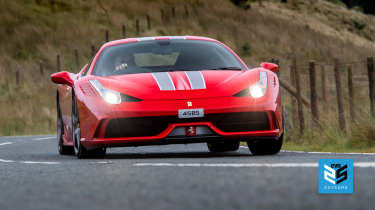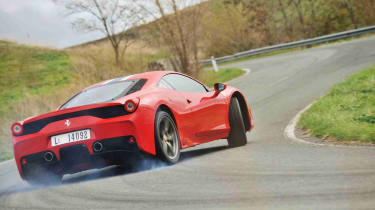Ferrari 458 Speciale (2013 - 2015): the best driver's car of the last 25 years
Of all the significant driver’s cars we’ve experienced over the last 25 years, one stands above all others. Ladies and gentlemen, the sublime, unsurpassed 458 Speciale
The last naturally aspirated, V8-powered Ferrari, it’s a 458 Italia with 90kg slashed away via stripping the interior, lighter glass and a Lexan engine cover; a 458 fitted with a tweaked 4.5-litre V8 producing an astonishing 597bhp at 9000rpm and with gearshift times cut by 44 per cent; the Ferrari that introduced Side Slip Control; the only car ever to win eCoty unanimously.’
It’s quite the accolade, that unanimous 2014 eCoty victory; the only one in the history of the magazine. It could be argued that it wasn’t the strongest of years – the Jaguar F-type R Coupe was a distant second, the Porsche Cayman GTS third – but it was a ten-car field that also included a BMW M3, McLaren 650S and Aston Martin Vanquish, so the stronger argument is that the Ferrari was simply on a higher plane than everything else. Subsequent experience bears this out: every encounter with the Speciale since has only reaffirmed its brilliance.
> Porsche Cayman GT4 RS v Huracán STO v 458 Speciale v Honda NSX‑R
The quote at the top was Jethro Bovingdon’s introduction for the 458 Speciale from 2023's test of mid-engined, naturally aspirated supercars (evo 301). The other contenders were the Honda NSX‑R (eCoty winner 2002), the Lamborghini Huracán STO and the new Porsche 718 Cayman GT4 RS, the car we’d designed the test for, reckoning it could set new standards for the genre. It was a fabulous test, on and around the sun-soaked Route Napoléon, and we’ll come back to it later.
More reviews
Right now I’m standing in north Wales, in the rain, next to Mike Wood’s Speciale, sitting on its standard-issue Michelin Cup 2s. Sounds like the wrong tyre call by Scuderia Ferrari but I’m really looking forward to driving it again on these epic roads. Four years ago, Mike and I were here with Enzo magazine for a group test of Ferrari’s extreme V8s – 348 GTC to 488 Pista – in similarly torrential conditions, and despite those Cup 2s the Speciale was extraordinarily good.
Within a few corners, I’ve discovered again why it was so impressive. Inevitably, it starts with superb steering. The Speciale’s is quick and accurate yet calm, and when you hit the apex with the car loaded up, even with water under the tyres, you can feel the grip at the treadblocks. So you know exactly where you are with the front end.
You know where you are with the rear, too. As with the front, grip is much stronger than you expect given the track-biased tyres, and so is traction, which you can exploit with remarkable precision thanks to that incredible naturally aspirated engine. The throttle is so precise that after you’ve spent a few miles tuning in, you can slice into a corner, see a puddle at the apex and set the throttle opening to just unstick the rear when you hit it. Or not. It’s your choice.
From the driver’s seat, you have a car under you that allows you to exploit it with complete confidence, even with the wipers working hard. From the passenger seat, however, the pace can seem ambitious, unrealistic on those Cup 2s, as I found when the photographer on that Enzo shoot, the normally unflappable Malcolm Griffiths, started to get agitated. On the gnarliest bit of the road I was zipping along and using plenty of revs, which didn’t help. The Speciale redlines at 9000rpm, which means it howls on through 7000rpm when most engines are done, so the noise and revs escalate manically when you might be expecting them to die, which rattled Malcy as we turned puddles to plumes of spray, to the point where he reminded me we hadn’t finished the shoot, that it was an owner’s car, that it was on Cup 2s, that it would mess up the magazine’s no claims bonus, that he had a wife and family, and so on and so forth…
Of course, the Speciale was brilliant in the dry too, as Henry Catchpole described memorably in his winner’s eulogy from eCoty 2014: ‘Intensity, agility and a blistering pace are a given at this level, but the Speciale is something else… it flatters your driving but still tests your ability. Not by drawing you in and then hanging you out to dry but by allowing you to work towards its (and your own) limits, step by step, layer by layer. Whatever your skill level, there’s never been a car that lets you fly so close to the sun.’ The revelation that its dynamics were just as communicative, exploitable and brilliant in the wet didn’t just cement its reputation so much as lift it to a whole new level. Last year’s group test on the Route Napoléon did the same thing again.
The regular 458 Italia was already a very good car with an amazing engine: its ‘F136’ flat-plane-crank V8 produced a remarkable 562bhp from 4.5 litres for an impressive 125bhp per litre, a superb figure for a naturally aspirated, fully homologated production engine. For the Speciale, Ferrari’s engineers managed to lift that up to 597bhp, which doesn’t sound a lot more – it’s about six per cent – but it raised the specific output to an astonishing 133bhp per litre. Equally important was the Speciale’s 90kg weight saving which, with the extra horsepower, helped boost the power-to-weight from the Italia’s 384 to 435bhp per ton.
The general industry swing from natural induction to turbocharging included the 458’s successor, the 488, whose 4-litre twin-turbo V8 delivered over 40 per cent more torque than the Speciale at half the revs, even in regular GTB spec. It made for a different experience. A notable exception to the turbo trend is the current Corvette, which in Z06 form comes with a flat-plane, naturally aspirated V8 known as Gemini. It owes a bit to the F136, Chevy freely admits. The company benchmarked the 458, and so keen were they to see what they could learn from its engine that they bought a 458 motor off eBay, sending a cheque for $25k to Poland. They were ‘pretty pleased and thrilled that the engine actually did show up’.
On stripping it down they were amazed at how small the bearings were and learned how Ferrari protected various components from the vibrations inherent in the flat-plane-crank V8 design, particularly ignition coil isolation and securing of electrical connectors to avoid fretting. They made ‘a lot of improvements’ in how they went about their own engine from what they found, and the Z06’s 5.5-litre V8 is impressive, making a strong 670bhp. Mind, with a specific output of 123bhp per litre it’s shy of the stock 458, let alone the Speciale.
It does make you wonder where the F136 V8 or its naturally aspirated successor might have got to today with a further decade of development. Ferrari’s V12s have remained naturally aspirated, and from the Speciale’s contemporary F12 and its 730bhp 6.3 V12, giving 117bhp per litre, there was the 769bhp F12tdf, then the 6.5-litre, 798bhp 812 Superfast, and now, sweet mercy, we’ve got the 812 Competizione with 819bhp, for a mighty 126bhp per litre. If the naturally aspirated V8 line had evolved on a similar trajectory, we might have a junior Ferrari supercar with a 10,000rpm, 670bhp, 4.7-litre flat-plane-crank V8.
Appealing as that sounds, as we discovered last summer on the Route Napoléon, the Speciale certainly doesn’t come up short against some of the newest and finest mid-engined cars ever built. It doesn’t get off to a flying start, though. It’s a bit of a faff with the (optional) full harness belts, when you fire it up it sounds a bit raw, a bit plain like an in-line four, as all flat-plane V8s do, and the steering wheel seems big and lumpy. So far, so unexciting. You grab a gear, scoot off down the road and there’s an engine resonance at 2500/3000rpm too, and you can’t help but wonder ‘Where’s all the magic I remember, the magic that’s stored in solid-state form in my memory? This needs to improve quite quickly.’
Then you floor it and Oh My God – literally OMG – the whole thing snaps into focus. The engine is manic, the sharpness of response is insane. It’s a proper shocker, like you’ve inadvertently touched a live feed. The first time you go for a 9000rpm full-throttle upshift, the gear thumps home emphatically, like the whole drivetrain is made from billet-machined steel, and the pace intensifies again. But after a short time driving this manic engine –or this manic engine driving you – you realise something almost profound, and it’s that you’re not on edge, you’re not feeling overwhelmed, the car isn’t too much. And this is because although the Speciale is frantic in sound and performance, it’s calm in the way it drives.
That’s down to two things. Firstly, the damping is extraordinarily good. It sort of passes you by initially, but the more roads you drive (and the more times you
get back in after a run in other cars) the more obvious it is that the ride of the Speciale is very rarely caught out. It’s exceptionally well-judged, filtering out all the tough stuff but leaving you feeling fully connected with the road. The second thing is the steering, which is quietly very precise, quick but not overly responsive, pitched just right; you get exactly what you want no matter what speed you’re doing. And that, together with the flat, supple, unflappable ride, gives you massive confidence because the car never feels loose or ragged. You always feel in control, almost like you’re in the eye of the storm. Indeed, when you follow it down a fast, tricky road, it looks how it feels: poised, almost serene.
Even when you flick-flack through a mini-roundabout at moderate speed, the whole car is agile and responsive but calm. At speed it’s the same, so you sort of creep up on the limit of grip. It’s the grip at the back that starts to run out first but it does so very, very gently. And of course you’re on top of it, because the steering is so tactile, the feedback so good, so you sense it almost before it happens. It’s usually inertia plus power, the combination just slightly overwhelming the rear grip. Fact is, for all its top-end fizz, in the dry the Speciale’s engine is never going to overload the Cup 2s with torque unless you’re provoking it aggressively, so it ends up being just gentle slips at the back, not even slides, just gentle slurs of the rear tyres.
The Huracán STO felt fabulous on that group test in the south of France… but after you’d driven the Speciale you recognised that the Lambo’s front and rear are different entities whereas, in the Ferrari, the whole car pivots around the centre point where the gearlever of a manual would be (incidentally, a manual ’box is something that you never find yourself hankering for). It slices into corners without a feeling of inertia at either end, whereas in the Lambo you start to feel the engine mass behind you. It’s a feeling rather than an issue, and we know that on a circuit you can overload the Huracán’s rear and have smokey, black lines for fun, but once you’ve felt the Speciale rotate effortlessly into corners, you know you’ve tasted something very special and everything else then seems to come up slightly short.
The Lambo’s powertrain has more sonic character and a top end that, unexpectedly, makes the Speciale feel just a little bit flat, the V10 hitting the limiter hard like it’s got another 1000rpm to go. But you have to remind yourself that the Ferrari is ten years old. Again, you wonder what a naturally aspirated successor to the Speciale might have been like with a decade more development but, in all honesty, it’s a moot point because in the end the opposition on that French test served simply to show how polished and complete the Speciale is. It’s on a different level because it is totally rounded and balanced in its abilities, and all those abilities are exceptional – the steering, the ride, the handling, the performance, the gearshift. It’s phenomenal, a masterpiece of a car. Peak mid-engined Ferrari without question. Maybe even peak Ferrari, full stop?
Nine years ago we crowned Porsche’s 997.2 GT3 RS the best car we had driven during this magazine’s first 200 issues, and yes it beat the Speciale to that particular accolade and we still stand by that result. But when it comes to encapsulating what makes so many of the cars in our top 25 list significant and wrapping it up in a single, intoxicating package that leaves you breathless in admiration, the Ferrari 458 Speciale is The One – the purest essence of a driver’s car.
What we thought
'The firm ride has no hint of harshness. It’s wedded beautifully to an accurate steering system, consistent and responsive brakes and a sweet brutality from the twin-clutch gearbox. The Speciale isn’t just stiffer, faster, louder than a 458 Italia… it’s just beautifully wrought, cohesive and – no question – it feels more serious, more focused and just plain better.
It is noticeably noisier than the Italia, though. It doesn’t howl and shriek quite as manically as a 430 Scuderia, but the engine can drone away if you’re in Race mode or upwards. There’s ever-present road noise that drums up through the bare floors, but in a car of this potential and focus it’s far from a deal-breaker.
Strangely, the gains in simple performance terms don’t feel as great as I’d expected, but no matter. This is still a seriously rapid car. The engine is remarkable, and the way it melds thick, instant torque with that explosive top-end delivery is quite breathtaking.
Braking late into a corner is made slightly more brutal thanks to the fast rev-match on downshifts, each shift bringing a jolt as the gears hit home. It feels like the shifts are completed with no margin at all. If the clutch closed a millisecond sooner the rear wheels would lock. There is no margin, no slack anywhere in this car.
The Speciale wears unique Michelin Pilot Cup 2 tyres - the same basic tyre as we’ve tried on the 911 GT3 and SLS Black Series – and the car simply dances over a seriously testing road that’s slick with moisture and fallen leaves. Grip is astounding and the steering accurately relays an impression of the surface and the tyre’s grip.
What of SSC? Well, ‘witchcraft’ just about sums it up. It’s almost supernatural, allowing you to drive so hard but remaining – for the most part – invisible. The system uses the e-diff to help manage the slide, where as SSC 2 (Slide Slip Control 2) found in the 488 GTB utilises the rear dampers for even greater control.' – Jethro Bovingdon
Ferrari 458 Speciale specs
| Engine | V8, 4497cc |
| Power | 597bhp @ 9000rpm |
| Torque | 398lb ft @ 6000rpm |
| 0-62 | 3sec (claimed) |
| Top speed | 202mph |
| Price new | £208,000 |
| Price today* | £310,000 - £400,000 (coupe) |
*Prices correct as of April 2024


